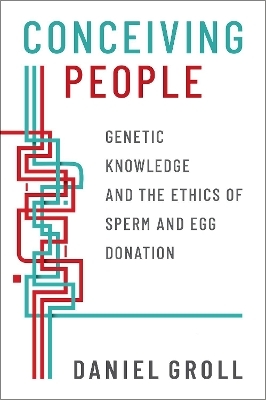
Conceiving People
Genetic Knowledge and the Ethics of Sperm and Egg Donation
Seiten
2021
Oxford University Press Inc (Verlag)
978-0-19-006305-4 (ISBN)
Oxford University Press Inc (Verlag)
978-0-19-006305-4 (ISBN)
This is an open access title available under the terms of a CC BY-NC-ND 4.0 International license. It is free to read at Oxford Scholarship Online and offered as a free PDF download from OUP and selected open access locations.
Each year, tens of thousands of children are conceived with donated gametes (sperm or eggs). By some estimates, there are over one million donor-conceived people in the United States and, of course, many more the world over. Some know they are donor-conceived. Some do not. Some know the identity of their donors. Others never will.
Questions about what donor-conceived people should know about their genetic progenitors are hugely significant for literally millions of people, including donor-conceived people, their parents, and donors. But the practice of gamete donation also provides a vivid occasion for thinking about questions that matter to everyone. What is the value of knowing who your genetic progenitors are? How are our identities bound up with knowing where we come from? What obligations do parents have to their children? And what makes someone a parent in the first place?
In Conceiving People: Identity, Genetics and Gamete Donation, Daniel Groll argues that people who plan to create a child with donated gametes should choose a donor whose identity will be made available to the resulting child. This is not, Groll argues, because having genetic knowledge is fundamentally important. Rather, it is because donor-conceived people are likely to develop a significant interest in having genetic knowledge and parents must help satisfy their children's significant interests. In other words, because a donor-conceived person is likely to care about having genetic knowledge, their parents should care too.
Each year, tens of thousands of children are conceived with donated gametes (sperm or eggs). By some estimates, there are over one million donor-conceived people in the United States and, of course, many more the world over. Some know they are donor-conceived. Some do not. Some know the identity of their donors. Others never will.
Questions about what donor-conceived people should know about their genetic progenitors are hugely significant for literally millions of people, including donor-conceived people, their parents, and donors. But the practice of gamete donation also provides a vivid occasion for thinking about questions that matter to everyone. What is the value of knowing who your genetic progenitors are? How are our identities bound up with knowing where we come from? What obligations do parents have to their children? And what makes someone a parent in the first place?
In Conceiving People: Identity, Genetics and Gamete Donation, Daniel Groll argues that people who plan to create a child with donated gametes should choose a donor whose identity will be made available to the resulting child. This is not, Groll argues, because having genetic knowledge is fundamentally important. Rather, it is because donor-conceived people are likely to develop a significant interest in having genetic knowledge and parents must help satisfy their children's significant interests. In other words, because a donor-conceived person is likely to care about having genetic knowledge, their parents should care too.
Daniel Groll is an Associate Professor of Philosophy at Carleton College in Northfield, MN and an Affiliate Faculty Member at the Center for Bioethics at the University of Minnesota.
Chapter 1: Introduction: The Central Question
Chapter 2: Keeping Secrets
Chapter 3: The Significant Interest View
Chapter 4: The Value of Genetic Knowledge
Chapter 5: The Bionormative Prejudice
Chapter 6: Tipping the Scale
Chapter 7: The Donor's Responsibilities
Chapter 8: Policy and Practice
Afterword
| Erscheinungsdatum | 01.09.2021 |
|---|---|
| Verlagsort | New York |
| Sprache | englisch |
| Maße | 241 x 165 mm |
| Gewicht | 522 g |
| Themenwelt | Geisteswissenschaften ► Philosophie |
| Medizin / Pharmazie ► Medizinische Fachgebiete ► Medizinethik | |
| Studium ► Querschnittsbereiche ► Geschichte / Ethik der Medizin | |
| Naturwissenschaften ► Biologie | |
| ISBN-10 | 0-19-006305-X / 019006305X |
| ISBN-13 | 978-0-19-006305-4 / 9780190063054 |
| Zustand | Neuware |
| Informationen gemäß Produktsicherheitsverordnung (GPSR) | |
| Haben Sie eine Frage zum Produkt? |
Mehr entdecken
aus dem Bereich
aus dem Bereich
Die Geschichte eines Weltzentrums der Medizin von 1710 bis zur …
Buch | Softcover (2021)
Lehmanns Media (Verlag)
17,95 €
von der Antike bis zur Gegenwart
Buch | Softcover (2024)
C.H.Beck (Verlag)
12,00 €
Krankheitslehren, Irrwege, Behandlungsformen
Buch | Softcover (2024)
C.H.Beck (Verlag)
39,95 €


